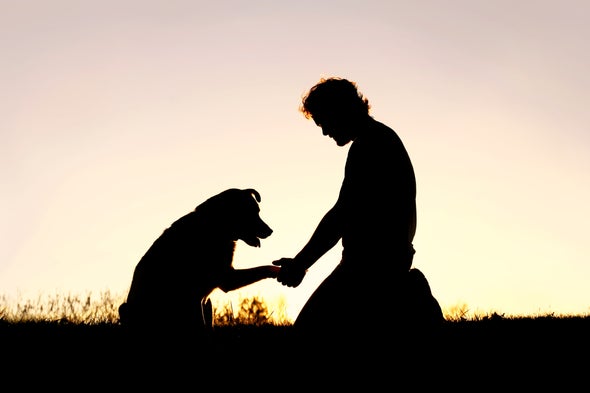
Doug’s amateur soccer team had just lost its playoff game, and Doug needed a pick-me-up. He decided to stop by the local animal shelter on his way home because puppies always put a smile on his face. He was by no means looking to adopt an animal, but Delia, a five-month-old mutt, changed his mind. “I had her for 17 years,” Doug said, wiping away tears in our psychotherapy session. “I knew it would be rough when she died, but I had no idea... I was a total wreck. I cried for days. I couldn’t get any work done. And worst of all, I was too embarrassed about it to tell anyone. I spent days at work crying in private and muttering ‘allergies’ whenever someone glanced at my puffy eyes.”
Losing a beloved pet is often an emotionally devastating experience. Yet as a society, we do not recognize how painful pet loss can be and how much it can impair our emotional and physical health. Symptoms of acute grief after the loss of a pet can last from one to two months, with symptoms of grief persisting up to a full year (on average). The New England Journal of Medicine reported in October 2017 that after her dog died, a woman experienced “broken heart syndrome”—a condition in which the response to grief is so severe the person exhibits symptoms that mimic a heart attack, including elevated hormone levels that can be 30 times greater than normal.
Although grief over the loss of a cherished pet may be as intense and even as lengthy as when a significant person in our life dies, our process of mourning is quite different. Many of the societal mechanisms of social and community support are absent when a pet dies. Few of us ask our employers for time off to grieve a beloved cat or dog because we fear doing so would paint us as overly sentimental, lacking in maturity or emotionally weak. Studies have found that social support is a crucial ingredient in recovering from grief of all kinds. Thus, we are not only robbed of invaluable support systems when our pet dies, but our own perceptions of our emotional responses are likely to add an extra layer of distress. We may feel embarrassed and even ashamed about the severity of the heartbreak we feel and, consequently, hesitate to disclose our feelings to our loved ones. That additional shame complicates the process of recovery by making it more lengthy and complex than it should be.
Losing a pet can leave significant voids in our life that we need to fill: it can change our daily routines, causing ripple effects that go far beyond the loss of the actual animal. Caring for our pet creates responsibilities and a schedule around which we often craft our days. We get exercise by walking our dog, and we socialize with other owners at the dog runs. We awake early every day to feed our cat (or we are woken by a pet if we forget!), but we get a lot more done because of it.
Losing a pet disrupts these routines. Cats, dogs, horses and other cherished pets provide companionship, reduce loneliness and depression, and can ease anxiety. They support our emotional well-being and imbue our actions with meaning. This is why, in addition to emotional pain, we feel aimless and lost in the days and weeks after our pet dies.
Recovering from pet loss, as in all forms of grief, requires us to recognize these changes and find ways to deal with them. We need to seek social support from people we know will understand and sympathize with our emotions and not judge us for them. Many animal clinics offer bereavement groups for pet owners.
We might need to reorganize our routines and daily activities so we do not lose the secondary benefits we derived from having our pet. For example, if our exercise came from walking our dog we need to find alternative ways to reach our daily “step goals.” If we spent most Saturday mornings with our fellow pet owners, we need to find other outlets through which we can socialize and enjoy the outdoors.
It is time we gave grieving pet owners the recognition, support and consideration they need. Yes, it is up to us to identify and address our emotional wounds when our pet dies, but the more validation we receive from those around us, the quicker and the more complete our psychological recovery will be.
Read the poem ..power of the dog by Kipling
ReplyDeleteThat illustrates this post
It so does but the love and joy of owning a job is unbeatable x
ReplyDelete